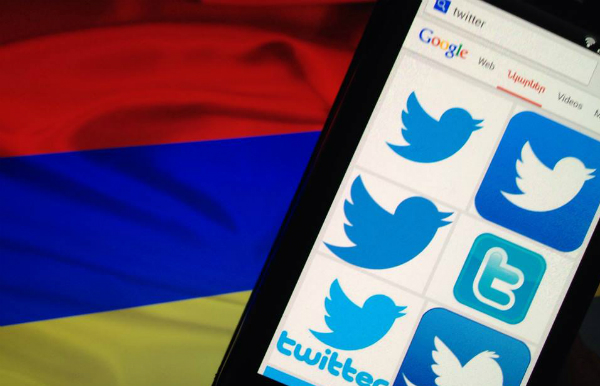
The flow of news and information today spreads mainly through social media. Since Twitter provides for an open flow of information, easily searchable by keywords, it has become the main platform for keeping up-to-date on international events.
Armenia is nearly absent on this platform — and not only because there are far fewer Armenia-based users than on Facebook or the Russian social networking site Odnoklassniki. But because few news outlets and state institutions are able to use this platform to communicate information to the rest of the world.
Today, mainly Armenia and Karabakh diplomats use this platform. However, since for the most part local news outlets broadcast information on Twitter on an automatic basis, while the majority of journalists is passive, there is nearly no flow of news from Armenia to the international community.
As it is apparent in the first graph, the word “Armenia” in Armenian script (#Հայաստան) is nearly absent in news flows (the data is from the analytics provider Topsy, owned by Twitter).
The word “Armenia” in Cyrillic script (#Армения) is the most stable, which is due to two main factors: the Russian press and the Russian-language Armenian community are active on Twitter, and Armenia captures the attention of the Russian press. The word “Armenia” in English (#Armenia) is also practically absent in searches. The sharp rise in mid-November is due to the Armenia-Portugal football match.
In the active Russian-language feeds, we are tied to our political and information doppelgänger, Azerbaijan, which can be seen in the graph of tweets about the two countries in a one-month period.
There was a spike in tweets surrounding the incident on November 12, when the situation at the border escalated after an Armenian helicopter was shot down by Azeri forces.
English-language Armenia-related tweets are ten times fewer than Russian-language ones. The escalation of the military situation at the border has practically no impact on the amount of tweets. Even Azerbaijan President Ilham Aliyev’s tirade on Twitter doesn’t particularly have an impact on the amount of posts related to Armenia or Azerbaijan.
There are fewer tweets referring to Karabakh (or Artsakh).
All this shows that Armenia is practically absent in foreign media, and when it is present, it is a passive subject, whom others speak about among themselves.
Samvel Martirosyan
The views expressed in the column are those of the author's and do not necessarily reflect the views of Media.am.


Add new comment
Comments by Media.am readers become public after moderation. We urge our readers not to leave anonymous comments. It’s always nice to know with whom one is speaking.
We do not publish comments that contain profanities, non-normative lexicon, personal attacks or threats. We do not publish comments that spread hate.